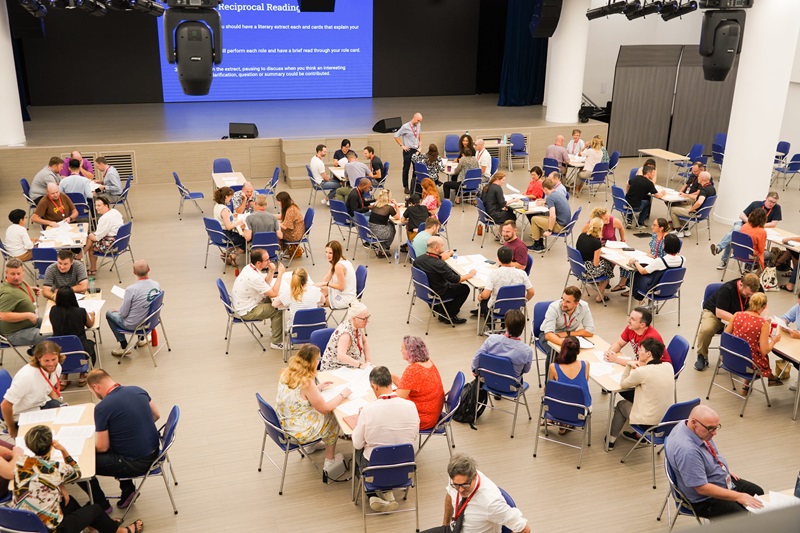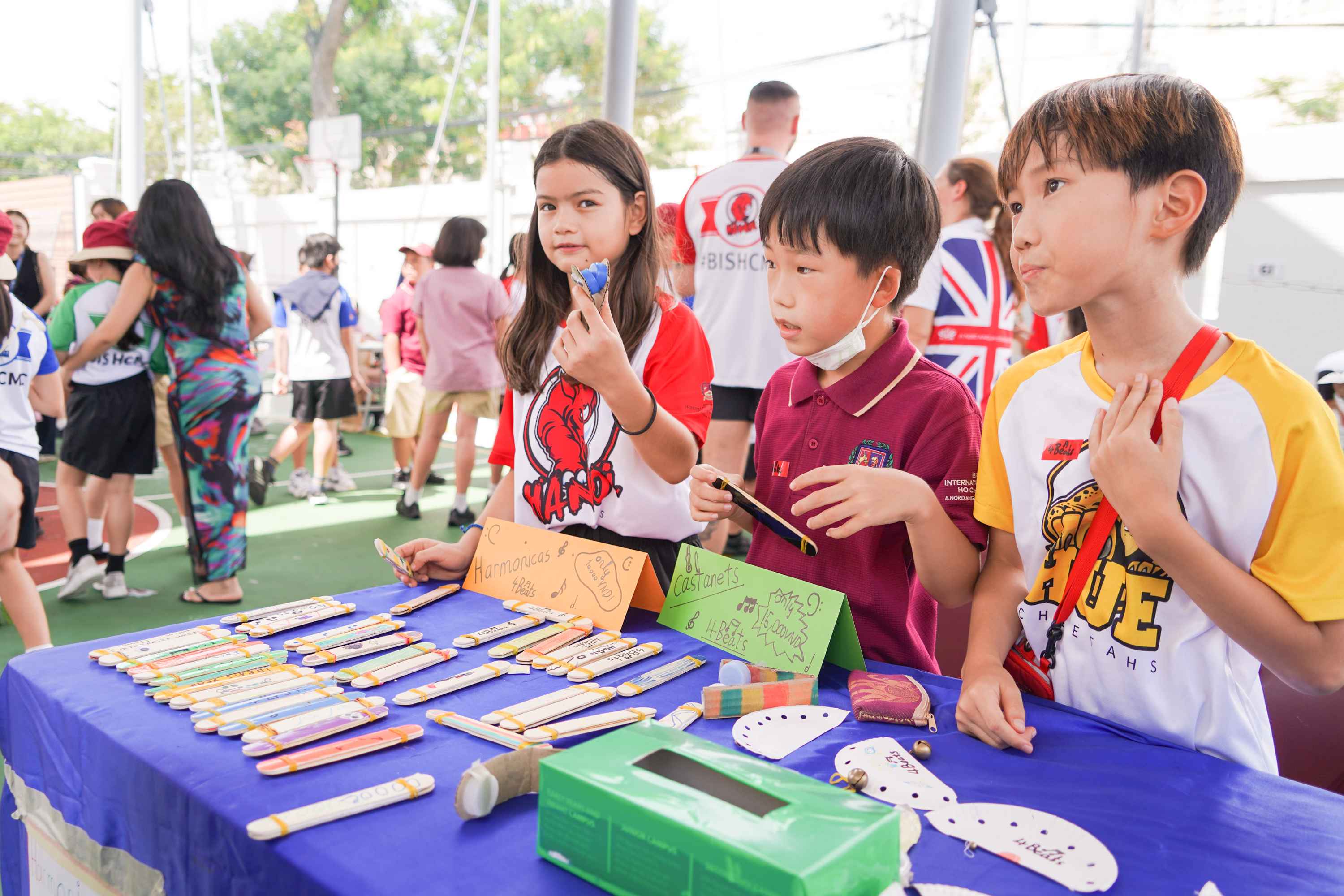At BIS HCMC literacy has always been a priority, but changes to our curriculum with the introduction of our 2 week timetable on the secondary campus have helped us rebalance learning and dedicate an extra lesson on literacy skills every fortnight. This is not just important for those studying literature but for every student, across every subject taught on our secondary campus. Research shows that literacy is a key indicator of success at IGCSE across all disciplines. Whether you’re studying history or maths or art, literacy proficiency is a key skill that must not be underestimated. So when developing our new timetable, one of the questions our curriculum leaders asked was how can we offer our students more opportunities to develop their literacy skills, and in doing so improve their entire academic performance across the curriculum?
What does the research say?
A recent GL Assessment analysed the data from more than 370,000 secondary school students in the UK and found a significant relationship between reading ability and GCSE results across all subjects. Interestingly the correlation was higher for Maths than for subjects like History. With exam questions often having word-based problems, it is clear that a good understanding of literacy is important not only in English and other language subjects, but across the wider curriculum. The report went on to say: “Given the importance of literacy to the whole school curriculum, it follows that those students who struggle with reading are at a significant disadvantage in every one of the GCSE examinations they take.”
So how can we apply this at BIS HCMC?
Currently, at both Key Stage 3 (Years 7 - 9) and Key Stage 4 (Years 10 - 11) more time is spent on Science than English and Maths, this in part due to the fact that Science incorporates Biology, Chemistry and Physics.
To enable more growth in literacy we are now rebalancing the scales and adding an extra 50-minute lesson per fortnight focused on literacy, with special skills-based lessons at Key Stage 3 called Reciprocal Reading. These sessions offer students the opportunity to delve deep into a variety of texts and learn skills that will help them decode any piece of writing, be it poetry or an article on AI. The repetition of these structured lessons will enable our students to consistently and autonomously comprehend texts on a deeper level, which will assist them as they go on to personalise their learning at IGCSE level.
What is reciprocal reading?
At KS3 stage we will be implementing Reciprocal Reading lessons, which have been shown to have a significant impact on reading age in a number of studies. In one such study of 98 schools and over 5000 students, an extra 2 months of growth was added to the students’ reading age every academic year.
In these lessons BIS HCMC students will become the teacher in small group reading sessions where each student will be assigned a role:
The Predictor: What will happen next in the text?
The Questioner: What questions do you have about the text?
The Clarifier: What do words/phrases/important ideas mean?
The Summariser: What happened in the text?
Have a look at the table below to see how these small student led discussions might play out and how the skills learned can provide a deeper comprehension of any text:
Role | Prompt | Conversation starters | Application |
The Predictor | What could the title reveal about the text?
How might a character react in this situation?
Can you anticipate any potential conflicts? | “I think X will happen because…”
“Why do we think the writer…” | The predictor learns how to make inferences based on their previous knowledge of other texts, narrative structures and their understanding of the world around them. |
The Questioner | Use question words to help you ask about ideas, characters and events (What, how, why, where) | “How does the writer…”
“Does anyone know why…” | Asking thoughtful questions helps the group to deduce deeper meaning and understand nuances within the text that may otherwise be overlooked. |
The Clarifier | What words do you not understand?
What strategies can you use to find out a meaning?
Is there a deeper or more complex meaning here? | “Does anyone know what X means?”
“Why do we think the writer chose the word…” | Clarifying helps the entire group to reach a deeper understanding of the text, as well as helping the students build their vocabulary, they develop a deeper understanding of the meaning of metaphors and connotations the author may have used. |
The Summariser | What happened at the end of the text?
What were the most important events?
What was the tone of the text? | “This text showed us that…”
“In this paragraph we can see…” | Differentiating between the essential and peripheral information in a text is an important skill to have in any subject. When doing research or preparing for an essay, it helps the student to understand the main points to focus on. |
It’s important to note that the teacher here is purely a facilitator, and that discussions must be led by the students themselves to allow their ideas to flow freely and come to their own conclusions about the text. Our teachers will prioritise engaging texts from a variety of sources, and genres, both fiction and non-fiction.
These small group discussions will also benefit those students who are less likely to speak up in class, as given their assigned role they will have a platform to share their thoughts in smaller, more comfortable group settings.
How will we use this at BIS HCMC?
Our non-Vietnamese passport holders will join sessions led by our English department, whilst our Vietnamese department will facilitate the lessons for our Vietnamese passport holders. As of August 2024, (with the first examinations in 2026), we are very excited to offer our Vietnamese passport holders the opportunity to achieve an IGCSE in their native language. These reading sessions in Vietnamese at Key Stage 3 will then further prepare the students for this brand new Cambridge IGCSE in the years to come.
An important thing to consider here is that these sessions are skills-based, meaning that they can apply skills learnt in their native language to any second language too, as well as the wider curriculum.
How is literacy applied across every subject at BIS HCMC?

Whilst the sessions are run by our English and Vietnamese teachers, every BIS HCMC teacher is being empowered to incorporate these pedagogical practices in their lessons. During inset week, every secondary teacher attended an interactive workshop on reciprocal reading and had the chance to become students and try it out for themselves to gain a deeper understanding of the sessions and how they can use similar practices with their subject specific texts.

The repetition of these skills-building sessions will make them become a natural practice for our students who can then apply them across every subject, whether it be using their summarising skills to pull out the key features of a maths question or their prediction skills to make inferences when reading a scientific research paper.
We are excited to see the growth of literacy skills in our Key Stage 3 students over the coming years, with our new reciprocal reading sessions. These new skills will give students the best possible outcomes for their IGCSE examinations and beyond, both in the IBDP and university courses around the world.


/chantal-author/selected-photo-(8).jpg?h=2122&iar=0&w=2122&rev=502bc73289a74a0684eddcbc18675d51&hash=CB3084D6B73F331A4C6EE83B00272DB3)
.jpg?h=4345&iar=0&w=7725&rev=1e8f5b07dd574af8adf9e056721addc6&hash=211519D79896A70B1F6DC238A0E46000)







